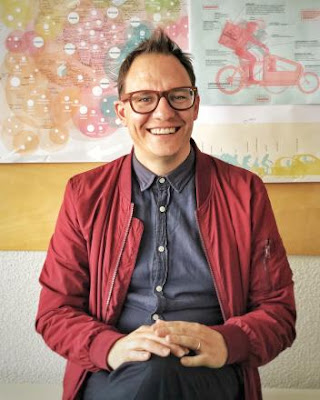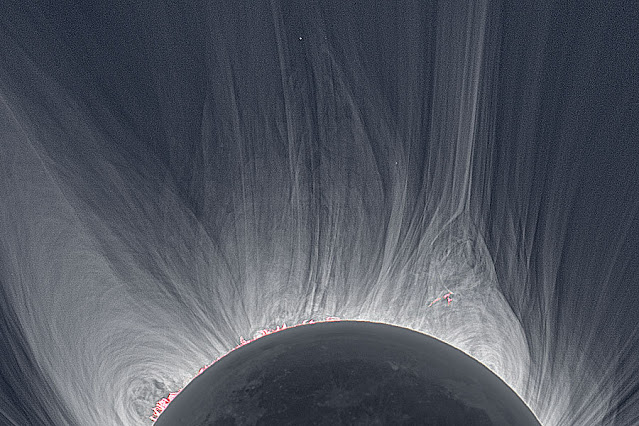Luna de mayo/
De todas las pantallas/
Tú me seduces./
Soy de los que cuando se comentan películas o series en un grupo se queda en fuera de juego. Lo mismo me pasa con el fútbol y otras muchas cuestiones. En estas dos frases pinto una autocaricatura que no se aleja mucho de la realidad. Y pese a todo he conseguido llegar a médico consultor, lo que significa muchos años de ejercicio, sin enloquecer ni desaparecer. Probablemente las humanidades tengan mucho que ver en esto. La capacidad de quedarme mirando la luna o escribiendo esta nota en lugar de tirarme al sofá a ver una tele que en mi caso no tiene apenas uso.
Por mi consulta suelen rotar unos cuantos estudiantes de medicina y residentes al año. A todos les recuerdo el valor de la llave de las humanidades, una llave que la mayoría tiene olvidada en un cajón bajo kilos de apuntes y material de las academias MIR. Una llave que abre muchas puertas, algunas con el poder de sanar nuestras heridas o proporcionarnos sentido o belleza, incluso en la tormenta.
Según la Wikipedia: Las humanidades de la salud son un campo de estudio interdisciplinario que se basa en aspectos de las artes y las humanidades en su enfoque de la atención médica, la salud y el bienestar.[1] Implica la aplicación de las artes creativas o bellas artes (incluidas las artes visuales, la música, las artes escénicas) y las humanidades (incluidos los estudios literarios, los idiomas, el derecho, la historia, la filosofía, la religión, etc.) a cuestiones de salud humana y bienestar.[2]
En mi juventud me sirvió de alimento la revista JANO que desgraciadamente se dejó de publicar. En ella descubrí lecturas, autores, músicas y propuestas de diversa índole. Mucho después recalé en la revista FOLIA HUMANÍSTICA y el blog Humanidades Médicas de la fundación Letamendi Forns. La tenaz labor de mi amigo Francesc Borrell a lo largo de los años es uno de esos ejercicios de generosidad que habría que poner en un pedestal. Sus comentarios de libros e ideas regados con la salsa de su erudición y criterio son valiosísimos.
Hoy me levanté con la pregunta de si habría otra forma mejor de referirse al concepto de humanidades médicas y tras reflexionar elegí el término Artes y Humanidades para profesionales de la salud. Me salió algo largo pero es claro e inclusivo dados los diferentes perfiles profesionales que existen y el bien que estas realidades producen en todos ellos.
En tiempos como estos donde las ciencias de la salud están abducidas por la tecnología, en una espiral de aceleración como nunca habíamos visto en la historia, es cada vez más necesario recuperar un necesario contrapeso para que las cabezas de los que nos dedicamos a la salud no estallen.
La Wikipedia aconseja estas cuatro referencias, de momento no puedo comentarlas ni recomendarlas:
- Jones, T., Wear, D., & Friedman, L. D. (Eds.). (2014). Health Humanities Reader. New Brunswick, NJ: Rutgers University Press.
- Crawford, P., Brown, B., Baker, C., Tischler, V., & Abrams, B. (2015). Health Humanities. London: Palgrave-Macmillan.
- Klugman, C.M., & Lamb, E.G. (Eds.). (2019). Research Methods in Health Humanities, Oxford: Oxford University Press.
- Crawford, P., Brown, B., & Charise, A. (Eds.). (2020). The Routledge Companion to Health Humanities, London: Routledge
Pero si quieren usar la llave de las Humanidades recuerden que es muy fácil, basta con mirar la luna o lo que haya al otro lado de la ventana. Basta con escribir un verso. Basta con emocionarse con alguna canción, o mejor aún bailarla o cantarla o tocarla con algún instrumento.
The Importance of the Humanities in Medicine and Health Sciences
Full moon in may/
From all the glowing screens/
You hold my gaze./
I am one of those people who, when films or TV series are being discussed in a group, is left completely out of the loop. The same happens with football and many other topics. In these two sentences, I sketch a self-caricature that’s not too far from reality. And yet, despite all that, I’ve managed to become a consultant physician — which implies many years in the profession — without going mad or vanishing. The humanities probably have a lot to do with it. The ability to stare at the moon or to write this note instead of collapsing on the sofa to watch a television that I hardly use.
Every year, a number of medical students and residents rotate through my clinic. I always remind them of the value of the key offered by the humanities — a key that most have left forgotten in a drawer, buried under piles of lecture notes and materials from MIR exam prep academies. It’s a key that opens many doors, some of them capable of healing our wounds or offering us meaning or beauty, even in the midst of a storm.
According to Wikipedia: Health humanities is an interdisciplinary field of study that draws on aspects of the arts and humanities in its approach to healthcare, health, and wellbeing. It involves the application of the creative or fine arts (including visual arts, music, performing arts) and the humanities (including literary studies, languages, law, history, philosophy, religion, etc.) to issues of human health and wellbeing.
In my youth, I was nourished by the magazine JANO, which sadly ceased publication. Through it, I discovered readings, authors, music, and proposals of many kinds. Much later, I came across the journal FOLIA HUMANÍSTICA and the Medical Humanities blog of the Letamendi Forns Foundation. The tireless work of my friend Francesc Borrell over the years is one of those acts of generosity that deserves a pedestal. His book reviews and reflections, enriched by his erudition and sound judgement, are truly invaluable.
This morning I woke up wondering whether there might be a better way to refer to the concept of medical humanities. After some thought, I settled on the term Arts and Humanities for Health Professionals. It’s a bit long, but clear and inclusive, considering the range of professional profiles out there — and the good these approaches do for all of them.
In times like these, where the health sciences have been abducted by technology, caught in a whirlwind of acceleration unlike anything we’ve seen in history, it is more necessary than ever to recover a vital counterweight — so that the minds of those of us working in healthcare don’t explode.
Wikipedia suggests the following references, which I have not yet had the chance to review or recommend:
-
Jones, T., Wear, D., & Friedman, L. D. (Eds.). (2014). Health Humanities Reader. New Brunswick, NJ: Rutgers University Press.
-
Crawford, P., Brown, B., Baker, C., Tischler, V., & Abrams, B. (2015). Health Humanities. London: Palgrave-Macmillan.
-
Klugman, C.M., & Lamb, E.G. (Eds.). (2019). Research Methods in Health Humanities. Oxford: Oxford University Press.
-
Crawford, P., Brown, B., & Charise, A. (Eds.). (2020). The Routledge Companion to Health Humanities. London: Routledge.
But if you want to use the key of the humanities, remember that it’s very simple: just look at the moon or whatever is on the other side of the window. Just write a verse. Just be moved by a song — or better yet, dance to it, sing it, or play it on an instrument.
人文学科在医学与健康科学中的重要性
五月的月亮
在所有闪亮屏幕中
唯你让我着迷。
我是那种在群聊中讨论电影或电视剧时会插不上话的人。足球也是如此,还有很多其他话题。以上两句话可以说是我自画像,并不夸张。尽管如此,我还是成为了一名资深的医生——这意味着多年从医,却没有疯掉或消失。人文学科可能在这其中发挥了重要作用。它让我有能力静静地看着月亮,或是写下这段文字,而不是倒在沙发上看电视(我家电视几乎不用)。
每年都会有一些医学生和住院医生在我的诊室轮转。我总会提醒他们:不要忘记那把属于人文学科的钥匙。这把钥匙常被许多人遗忘在抽屉底下,压在厚厚的讲义和考试资料之下。但它能打开很多扇门,其中一些能疗愈我们的伤口,为我们带来意义和美,哪怕是在风暴中。
根据维基百科:健康人文学科是一个跨学科研究领域,它结合了艺术与人文学科的内容,用以探讨医疗保健、健康与福祉等问题。它涉及对创造性艺术或美术(包括视觉艺术、音乐、表演艺术)及人文学科(包括文学、语言、法律、历史、哲学、宗教等)的应用,以解决人类健康与福祉的问题。
年轻时,我经常阅读《JANO》杂志,那是我的精神食粮,可惜后来停刊了。通过这本杂志,我认识了许多书籍、作家、音乐和各种思想。很多年后,我又发现了《FOLIA HUMANÍSTICA》期刊和Letamendi Forns基金会的医学人文博客。我朋友Francesc Borrell多年来所做的坚持不懈的工作,是一种应该被铭记的慷慨行为。他的书评和思想评论,结合他丰富的学识和独到的见解,极具价值。
今天早上,我思考是否有更好的方式来称呼“医学人文学科”这个概念。最后我选择了“面向健康专业人员的艺术与人文学科”这一说法。虽然有点长,但它明确而包容,能涵盖各种专业背景,并且这些内容确实对所有从业者都大有益处。
如今,健康科学似乎被技术“绑架”,被卷入了史无前例的加速旋涡中,因此我们更需要一个有力的平衡点——以免我们这些致力于健康事业的人“头脑爆炸”。
维基百科建议以下四本参考书,我目前尚未有机会阅读和推荐:
-
Jones, T., Wear, D., & Friedman, L. D. (编辑). (2014). Health Humanities Reader. 新泽西州新布朗斯维克:罗格斯大学出版社。
-
Crawford, P., Brown, B., Baker, C., Tischler, V., & Abrams, B. (2015). Health Humanities. 伦敦:帕尔格雷夫·麦克米伦出版社。
-
Klugman, C.M., & Lamb, E.G. (编辑). (2019). Research Methods in Health Humanities. 牛津:牛津大学出版社。
-
Crawford, P., Brown, B., & Charise, A. (编辑). (2020). The Routledge Companion to Health Humanities. 伦敦:劳特利奇出版社。
但如果你想使用那把属于人文学科的钥匙,请记住,其实很简单:只需望向月亮,或窗外的风景;写下一句诗;为一首歌曲感动,或者更好——跳着舞去感受它,唱出来,或用乐器弹奏它。
.jpg)
.jpg)

















